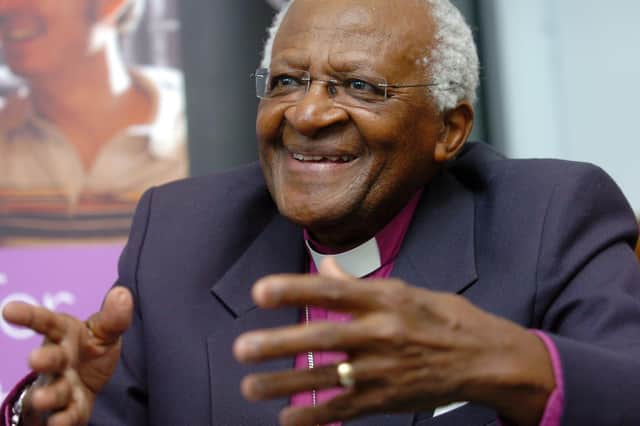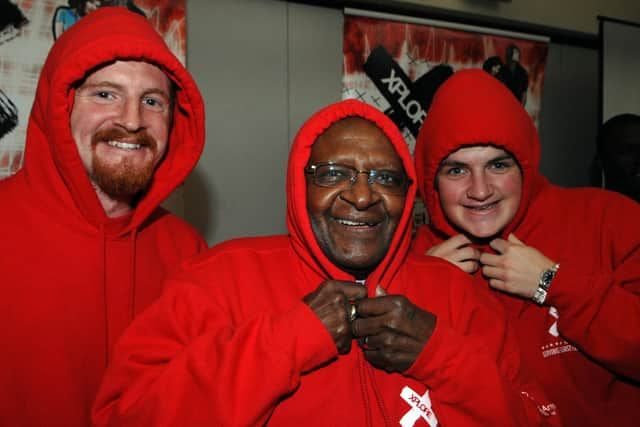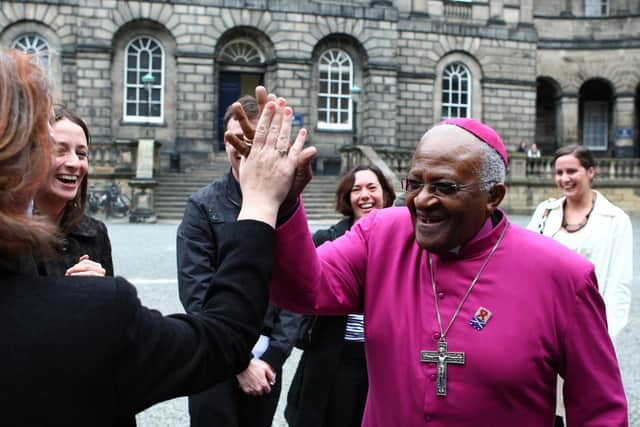Yorkshire pays tribute to 'remarkable crusader against injustice' Desmond Tutu who has died aged 90


A contemporary of Nelson Mandela, Tutu was one of the driving forces behind the movement to end the policy of racial segregation and discrimination against the non-white majority in South Africa.
A courageous political campaigner, his homely manner, obvious personal kindness and wit endeared him to those he met on the global stage.
Advertisement
Hide AdAdvertisement
Hide AdHull’s Wilberforce Institute, of which the churchman was patron, tweeted on Sunday that they were proud of their association with “this remarkable crusader against injustice” adding: “We remember him with great fondness and huge appreciation.”


Tutu visited Hull on four occasions between 1989 and 2007, and his visits included delivering the annual Wilberforce Lecture in Hull, commemorating the life and achievements of the anti-slavery campaigner William Wilberforce. He was presented with the freedom of Hull.
Archbishop of York Stephen Cottrell said one of the greatest images of the second half of the 20th century was Tutu and Mandela dancing at the end of the closing session of the Truth and Reconciliation Commission in Cape Town.
"This incredibly joyful little disciple of Jesus Christ" had been asked to chair it, he said, as one of the few people other than Mandela "who could unite the nation and carry the trust of everyone. In this respect, he was a giant."
Advertisement
Hide AdAdvertisement
Hide AdTutu, a Nobel Prize winner, showed no fear of the brutal South African regime. He once wrote a letter to then prime minister John Vorster, warning the situation in South Africa was “a powder barrel that can explode at any time”. The letter was never answered.


It is said that he did as much as anyone, including even Mandela, to bring apartheid in South Africa to its knees, leading to the formation of a democratically elected government under Mandela himself.
Tutu was generally credited with coining the term Rainbow Nation describing post-apartheid South Africa after 1994 under African National Congress rule.
In 1996, the year he stepped down as Archbishop of Cape Town, Tutu was diagnosed with prostate cancer. But this in no way weakened his sense of public spiritedness.
Advertisement
Hide AdAdvertisement
Hide AdBorn in Klerksdorp, Transvaal, on October 7 1931, Tutu moved to Johannesburg aged 12. He was ordained as an Anglican priest in 1960, becoming chaplain at the University of Fort Hare, a hotbed of dissent and one of the few quality universities for black African students.
He left that post in 1962 and travelled to King’s College London, where he received degrees in theology.
The first African to be appointed Anglican Dean of Johannesburg, his sterling work in the cause of the anti-apartheid movement led to his receiving numerous doctorates and academic awards from all over the world.
However he was also harsh in his criticism of the violent tactics of some anti-apartheid groups, such as the African National Congress.
Advertisement
Hide AdAdvertisement
Hide AdHe denounced terrorism and Communism and was awarded the Nobel Peace Prize in October 1984 for his “role as a unifying leader figure in the campaign to resolve the problem of apartheid in South Africa”.
After apartheid fell, he headed the Truth and Reconciliation Commission for which he was awarded the Sydney Peace Prize in 1999.
In 2009 he donned a red hoodie to launch a gap year scheme, Xplore, in Sheffield, for young people sponsored by Christian charity the Church Army.
Unlike many African churchmen, he opposed Christian discrimination against homosexuals and also criticised human rights abuses in Zimbabwe, describing then president Robert Mugabe as “a caricature of an African dictator”.
Advertisement
Hide AdAdvertisement
Hide AdHe eventually retired from public life in 2011 but he continued to speak out.
The following year he called for Tony Blair and former US president George W Bush to be taken to the International Court of Justice in The Hague for their role in the invasion and occupation of Iraq.
Tutu later opposed then US president Donald Trump’s decision to recognise Jerusalem as the official capital of Israel.
In 2019, he met the Duke and Duchess of Sussex and their son Archie during their tour to southern Africa.
Archbishop Tutu married Leah Nomali in 1955 and the couple had four children.